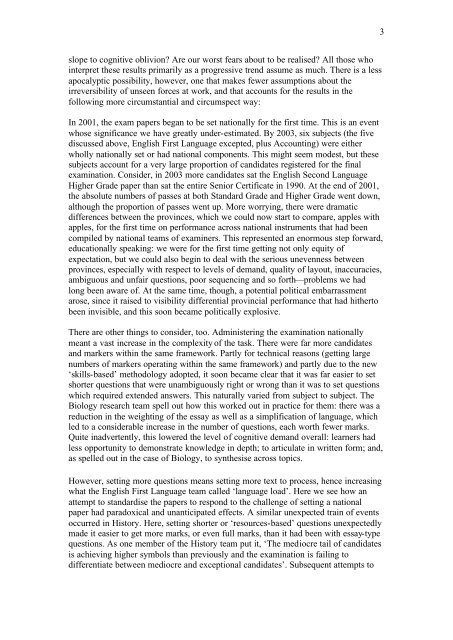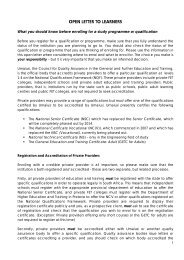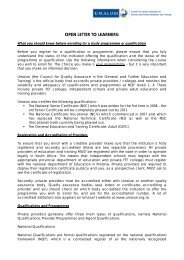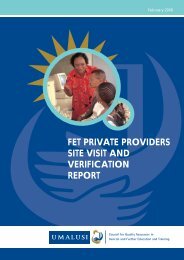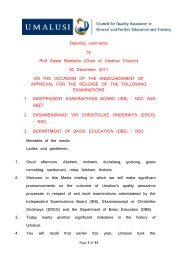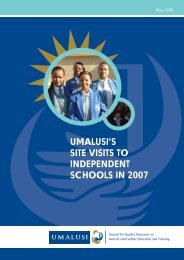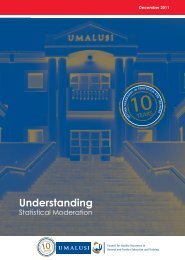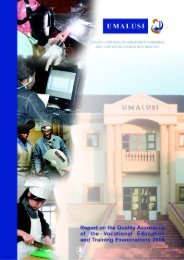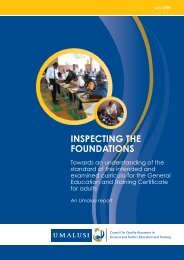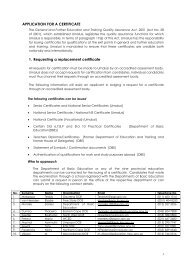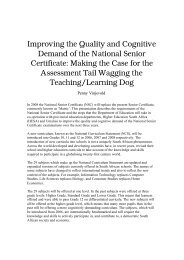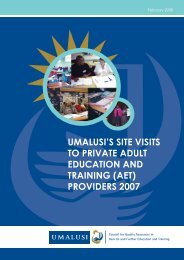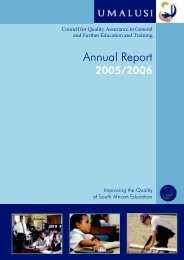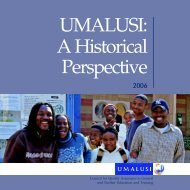The Challenge of Cognitive Demand - Umalusi
The Challenge of Cognitive Demand - Umalusi
The Challenge of Cognitive Demand - Umalusi
Create successful ePaper yourself
Turn your PDF publications into a flip-book with our unique Google optimized e-Paper software.
3slope to cognitive oblivion? Are our worst fears about to be realised? All those whointerpret these results primarily as a progressive trend assume as much. <strong>The</strong>re is a lessapocalyptic possibility, however, one that makes fewer assumptions about theirreversibility <strong>of</strong> unseen forces at work, and that accounts for the results in thefollowing more circumstantial and circumspect way:In 2001, the exam papers began to be set nationally for the first time. This is an eventwhose significance we have greatly under-estimated. By 2003, six subjects (the fivediscussed above, English First Language excepted, plus Accounting) were eitherwholly nationally set or had national components. This might seem modest, but thesesubjects account for a very large proportion <strong>of</strong> candidates registered for the finalexamination. Consider, in 2003 more candidates sat the English Second LanguageHigher Grade paper than sat the entire Senior Certificate in 1990. At the end <strong>of</strong> 2001,the absolute numbers <strong>of</strong> passes at both Standard Grade and Higher Grade went down,although the proportion <strong>of</strong> passes went up. More worrying, there were dramaticdifferences between the provinces, which we could now start to compare, apples withapples, for the first time on performance across national instruments that had beencompiled by national teams <strong>of</strong> examiners. This represented an enormous step forward,educationally speaking: we were for the first time getting not only equity <strong>of</strong>expectation, but we could also begin to deal with the serious unevenness betweenprovinces, especially with respect to levels <strong>of</strong> demand, quality <strong>of</strong> layout, inaccuracies,ambiguous and unfair questions, poor sequencing and so forth—problems we hadlong been aware <strong>of</strong>. At the same time, though, a potential political embarrassmentarose, since it raised to visibility differential provincial performance that had hithertobeen invisible, and this soon became politically explosive.<strong>The</strong>re are other things to consider, too. Administering the examination nationallymeant a vast increase in the complexity <strong>of</strong> the task. <strong>The</strong>re were far more candidatesand markers within the same framework. Partly for technical reasons (getting largenumbers <strong>of</strong> markers operating within the same framework) and partly due to the new‘skills-based’ methodology adopted, it soon became clear that it was far easier to setshorter questions that were unambiguously right or wrong than it was to set questionswhich required extended answers. This naturally varied from subject to subject. <strong>The</strong>Biology research team spell out how this worked out in practice for them: there was areduction in the weighting <strong>of</strong> the essay as well as a simplification <strong>of</strong> language, whichled to a considerable increase in the number <strong>of</strong> questions, each worth fewer marks.Quite inadvertently, this lowered the level <strong>of</strong> cognitive demand overall: learners hadless opportunity to demonstrate knowledge in depth; to articulate in written form; and,as spelled out in the case <strong>of</strong> Biology, to synthesise across topics.However, setting more questions means setting more text to process, hence increasingwhat the English First Language team called ‘language load’. Here we see how anattempt to standardise the papers to respond to the challenge <strong>of</strong> setting a nationalpaper had paradoxical and unanticipated effects. A similar unexpected train <strong>of</strong> eventsoccurred in History. Here, setting shorter or ‘resources-based’ questions unexpectedlymade it easier to get more marks, or even full marks, than it had been with essay-typequestions. As one member <strong>of</strong> the History team put it, ‘<strong>The</strong> mediocre tail <strong>of</strong> candidatesis achieving higher symbols than previously and the examination is failing todifferentiate between mediocre and exceptional candidates’. Subsequent attempts to


